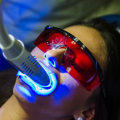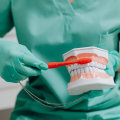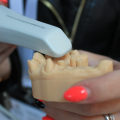Basically, a dentist is a doctor. But hygienists can still do more than just an assistant. The dentist examines and treats your teeth, the dental hygienist cleans your teeth and helps you prevent diseases, and the dental assistant helps the dentist (and sometimes the hygienist). Dental hygienists perform much of their work independently, with only the general supervision of a licensed dentist.
Dental hygienists are an important part of dentist-led teams. Their work eliminates a considerable burden on the dentist, allowing him to perform more advanced procedures. Therefore, it is quite common for dental hygienists to perform many of the preventive dental procedures in an office, such as cleaning teeth, examining patients for oral diseases, and other preventive dental care. They also educate patients on ways to improve and maintain good oral health.
Dentists are competent to provide more specialized treatment, while dental hygienists provide general dental care. A dental hygienist will save your teeth by treating gum disease and help people get rid of related problems, such as bad breath. A dentist receives more specialized training than a hygienist and is qualified to perform more complicated surgeries and procedures. They provide a wide range of treatments related to dental care.
Much of a dentist's job is to fix a problem, in contrast to the dental hygienist's preventive approach. That said, the dentist will inspect the patient's mouth for signs of gingivitis and other general hygiene issues. Dental hygienists and dentists help patients achieve better teeth and gums. Dental hygienists focus on cleaning teeth, while dentists supervise dental hygienists and provide treatment to patients in relation to their teeth, gums and mouth.
Keep reading to learn more about these two oral health professionals. One of the biggest differences between dental hygienists and dentists is the role they play in dental practice. If you're wondering if you should become a dentist or an HRD, the first thing to consider is what aspects of clinical care interest you most. Dentist work is similar in some ways, but there are key differences.
The dentist has the role of supervision in the clinical setting. Performs patient examinations and performs procedures such as tooth decay removal, fillings, and other dental repairs. The dentist is responsible for analyzing patient information collected by the RDH. The dentist also diagnoses dental diseases and mechanical problems.
Dentists make referrals to specialists, such as oral surgeons and orthodontists, as needed. Dentists are usually office owners, but they don't have to be. Dental hygienists generally don't own offices, but they can in some states. One thing dentists and HRDH have in common is the ability to choose from a variety of career paths.
HRDs can work in a single dental office, in several offices at once, or through a temporary agency for dental hygienists. Other options include clinics serving disadvantaged populations, military clinics, and professional dental hygiene schools. RDH temporary jobs are available through temporary agencies for dental hygienists or through more modern cloud-based tools, such as Cloud Dentistry. Dentists often start working as associates (some with a contractual purchase option, as Chris Salierno describes in his blog, The Curious Dentist).
Dentists may eventually own an office or enter corporate dentistry. If a dentist is not prepared or interested in owning ownership, they may take a full-time job, part-time job, temporary jobs, or some combination. Temporary Agencies Aren't Just for Dental Hygienists. Great for dentists just starting out. Dentists may eventually own an office or enter corporate dentistry. If a dentist is not prepared or interested in owning ownership, they may take a full-time job, part-time job, temporary jobs, or some combination. Temporary Agencies Aren't Just for Dental Hygienists. Great for dentists just starting out.
When looking to cover their work schedules, dentists can use placement agencies or job search platforms, such as Cloud Dentistry, to find work. Non-clinical prospects include educational environments and consultant positions. Despite differences between HRDs and dentists, they tend to share a love for dentistry and helping patients. Dental office owners know that both professions are critical to the success of the practice.
Those considering dentistry should also consider the many forms that a dental career can take. Zero Upfront Fees for Dental Offices. For specialists, dentists, hygienists and dental assistants. Pros and Cons of Free Temporary Dental Agency.
Dental hygienists are responsible for cleaning teeth and educating patients on techniques they should use to improve their overall oral health. While dental hygienists are usually seen separately, they also help dentists with appointments with their patients, as does the dental assistant for surgery. Dentists and dental hygienists provide important dental care, and patients can expect to interact with people from both careers when they attend a dentist appointment. Periodontists, who focus on treating gum disease and other gum concerns, are just one example of dental specialists.
Regardless of degree type, courses are likely to cover dental anatomy, biomedical science, periodontology, preventive oral hygiene, and disease prevention. A dental hygienist is an oral health professional who works with patients before the dentist sees and evaluates them. After completing the dental admission test (DAT), they attend a four-year dental school program. Both associate degree level (two-year) and undergraduate (four-year) programs qualify a person to take the test and become a licensed dental hygienist.
If a person's goal is to be a general dentist, they can practice after earning a dental degree. Like any other dental office in the region, My Dentist Burbank also has two different dental experts. Dental hygienists focus on cleaning teeth, so they use instruments such as ultrasonic tools, lasers and polishers. In addition, a dental hygienist advises patients on the best way to prevent tooth and gum disease, and provides guidance on preventive activities, such as brushing and flossing regularly.
A hygienist, on the other hand, is there to maintain preventive care and help you avoid any major problems. We discuss the difference between the dentist and the dental hygienist and what you should expect from both. A dental hygienist often takes x-rays, cleans patients' teeth, removes plaque, and applies enamel to teeth. .
.



